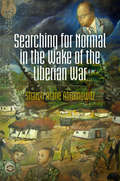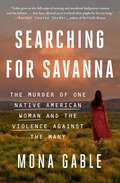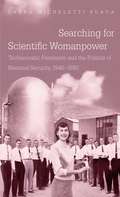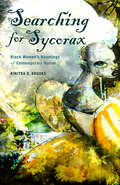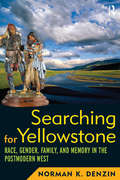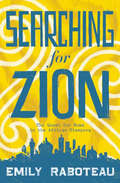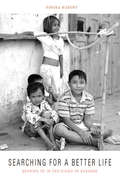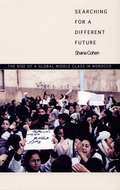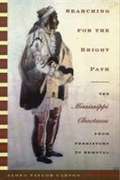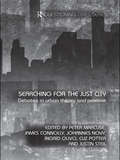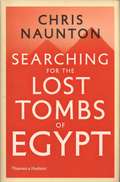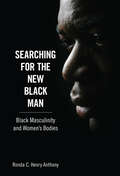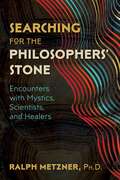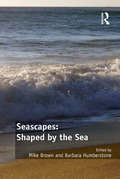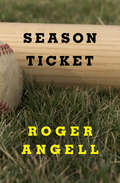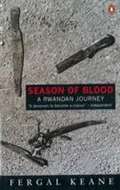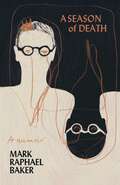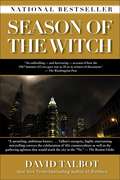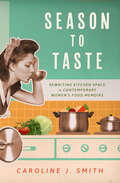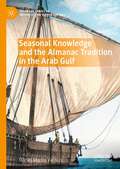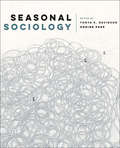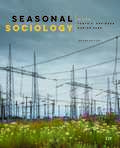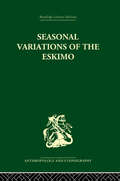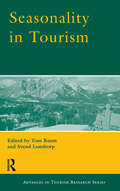- Table View
- List View
Searching for Normal in the Wake of the Liberian War (Pennsylvania Studies in Human Rights)
by Sharon Alane AbramowitzAt the end of Liberia's thirteen-year civil war, the devastated population struggled to rebuild their country and come to terms with their experiences of violence. During the first decade of postwar reconstruction, hundreds of humanitarian organizations created programs that were intended to heal trauma, prevent gendered violence, rehabilitate former soldiers, and provide psychosocial care to the transitioning populace. But the implementation of these programs was not always suited to the specific mental health needs of the population or easily reconciled with the broader aims of reconstruction and humanitarian peacekeeping, and psychiatric treatment was sometimes ignored or unevenly integrated into postconflict humanitarian health care delivery.Searching for Normal in the Wake of the Liberian War explores the human experience of the massive apparatus of trauma-healing and psychosocial interventions during the first five years of postwar reconstruction. Sharon Alane Abramowitz draws on extensive fieldwork among the government officials, humanitarian leaders, and an often-overlooked population of Liberian NGO employees to examine the structure and impact of the mental health care interventions, in particular the ways they were promised to work with peacekeeping and reconstruction, and how the reach and effectiveness of these promises can be measured. From this courageous ethnography emerges a geography of trauma and the ways it shapes the lives of those who give and receive care in postwar Liberia.
Searching for Savanna: The Murder of One Native American Woman and the Violence Against the Many
by Mona GableA gripping and illuminating investigation into the disappearance of Savanna LaFontaine-Greywind when she was eight months pregnant, highlighting the shocking epidemic of violence against Native American women in America and the societal ramifications of government inaction.In the summer of 2017, twenty-two-year-old Savanna LaFontaine-Greywind vanished. A week after she disappeared, police arrested the white couple who lived upstairs from Savanna and emerged from their apartment carrying an infant girl. The baby was Savanna&’s, but Savanna&’s body would not be found for days. The horrifying crime sent shock waves far beyond Fargo, North Dakota, where it occurred, and helped expose the sexual and physical violence Native American women and girls have endured since the country&’s colonization. With pathos and compassion, Searching for Savanna confronts this history of dehumanization toward Indigenous women and the government&’s complicity in the crisis. Featuring in-depth interviews, personal accounts, and trial analysis, Searching for Savanna investigates these injustices and the decades-long struggle by Native American advocates for meaningful change.
Searching for Scientific Womanpower
by Laura Micheletti PuacaThis compelling history of what Laura Micheletti Puaca terms "technocratic feminism" traces contemporary feminist interest in science to the World War II and early Cold War years. During a period when anxiety about America's supply of scientific personnel ran high and when open support for women's rights generated suspicion, feminist reformers routinely invoked national security rhetoric and scientific "manpower" concerns in their efforts to advance women's education and employment. Despite the limitations of this strategy, it laid the groundwork for later feminist reforms in both science and society. The past and present manifestations of technocratic feminism also offer new evidence of what has become increasingly recognized as a "long women's movement."Drawing on an impressive array of archival collections and primary sources, Puaca brings to light the untold story of an important but largely overlooked strand of feminist activism. This book reveals much about the history of American feminism, the politics of national security, and the complicated relationship between the two.
Searching for Sycorax: Black Women's Hauntings of Contemporary Horror
by Kinitra D. BrooksSearching for Sycorax highlights the unique position of Black women in horror as both characters and creators. Kinitra D. Brooks creates a racially gendered critical analysis of African diasporic women, challenging the horror genre’s historic themes and interrogating forms of literature that have often been ignored by Black feminist theory. Brooks examines the works of women across the African diaspora, from Haiti, Trinidad, and Jamaica, to England and the United States, looking at new and canonized horror texts by Nalo Hopkinson, NK Jemisin, Gloria Naylor, and Chesya Burke. These Black women fiction writers take advantage of horror’s ability to highlight U.S. white dominant cultural anxieties by using Africana folklore to revise horror’s semiotics within their own imaginary. Ultimately, Brooks compares the legacy of Shakespeare’s Sycorax (of The Tempest) to Black women writers themselves, who, deprived of mainstream access to self-articulation, nevertheless influence the trajectory of horror criticism by forcing the genre to de-centralize whiteness and maleness.
Searching for Whitopia: An Improbable Journey to the Heart of White America
by Rich BenjaminAs America becomes more and more racially diverse, Rich Benjamin noticed a phenomenon: Some communities were actually getting less multicultural. So he got out a map, found the whitest towns in the USA--and moved in.A journalist-adventurer, Benjamin packed his bags and embarked on a 26,909-mile journey throughout the heart of white America, to some of the fastest-growing and whitest locales in our nation. Benjamin calls these enclaves "Whitopias." In this groundbreaking book, he shares what he learned as a black man in Whitopia. Benjamin's journey to unlock the mysteries of Whitopia took him from a three-day white separatist retreat with links to Aryan Nations in North Idaho to exurban mega-churches down South, and many points in between. A compelling raconteur, bon vivant, and scholar, Benjamin reveals what Whitopias are like and explores the urgent social and political implications of this startling phenomenon. Benjamin's groundbreaking study is one of few to have illuminated in advance the social and political forces propelling the rise of Donald Trump. After all, Trump carried 94 percent of America's Whitopian counties. And he won a median 67 percent of the vote in Whitopia compared to 46 percent of the vote nationwide.Leaving behind speculation or sensationalism, Benjamin explores the future of whiteness and race in an increasingly multicultural nation.
Searching for Yellowstone: Race, Gender, Family and Memory in the Postmodern West
by Norman K DenzinYellowstone. Sacagawea. Lewis & Clark. Transcontinental railroad. Indians as college mascots. All are iconic figures, symbols of the West in the Anglo-American imagination. Well-known cultural critic Norman Denzin interrogates each of these icons for their cultural meaning in this finely woven work. Part autoethnography, part historical narrative, part art criticism, part cultural theory, Denzin creates a postmodern bricolage of images, staged dramas, quotations, reminiscences and stories that strike to the essence of the American dream and the shattered dreams of the peoples it subjugated.
Searching for Zion: The Quest for Home in the African Diaspora
by Emily RaboteauFrom Jerusalem to Ghana to Katrina-ravaged New Orleans, a woman reclaims her history in a &“beautifully written and thought-provoking&” memoir (Dave Eggers, author of A Hologram for the King and Zeitoun). A biracial woman from a country still divided along racial lines, Emily Raboteau never felt at home in America. As the daughter of an African American religious historian, she understood the Promised Land as the spiritual realm black people yearned for. But while visiting Israel, the Jewish Zion, she was surprised to discover black Jews. More surprising was the story of how they got there. Inspired by their exodus, her question for them is the same one she keeps asking herself: have you found the home you&’re looking for? In this American Book Award–winning inquiry into contemporary and historical ethnic displacement, Raboteau embarked on a ten-year journey around the globe and back in time to explore the complex and contradictory perspectives of black Zionists. She talked to Rastafarians and African Hebrew Israelites, Evangelicals and Ethiopian Jews—all in search of territory that is hard to define and harder to inhabit. Uniting memoir with cultural investigation, Raboteau overturns our ideas of place, patriotism, dispossession, citizenship, and country in &“an exceptionally beautiful . . . book about a search for the kind of home for which there is no straight route, the kind of home in which the journey itself is as revelatory as the destination&” (Edwidge Danticat, author of The Farming of Bones).
Searching for a Better Life: Growing Up in the Slums of Bangkok
by Sorcha MahonyLife in Bangkok for young people is marked by profound, interlocking changes and transitions. This book offers an ethnographic account of growing up in the city’s slums, struggling to get by in a rapidly developing and globalizing economy and trying to fulfil one’s dreams. At the same time, it reflects on the issue of agency, exploring its negative potential when exercised by young people living under severe structural constraint. It offers an antidote to neoliberal ideas around personal responsibility, and the assumed potential for individuals to break through structures of constraint in any sustained way.
Searching for a Different Future: The Rise of a Global Middle Class In Morocco
by Shana CohenBy examining how neoliberal economic reform policies have affected educated young adults in contemporary Morocco, Searching for a Different Future posits a new socioeconomic formation: the global middle class. During Morocco's postcolonial period, from the 1950s through the 1970s, development policy and nationalist ideology supported the formation of a middle class based on the pursuit of education, employment, and material security. Neoliberal reforms adopted by Morocco since the early 1980s have significantly eroded the capacity of the state to nurture the middle class, and unemployment and temporary employment among educated adults has grown. There is no longer an obvious correlation between the best interests of the state and those of the middle-class worker. As Shana Cohen demonstrates, educated young adults in Morocco do not look toward the state for economic security and fulfillment but toward the diffuse, amorphous global market. Cohen delves into the rupture that has occurred between the middle class, the individual, and the nation in Morocco and elsewhere around the world. Combining institutional economic analysis with cultural theory and ethnographic observation including interviews with seventy young adults in Casablanca and Rabat, she reveals how young, urban, educated Moroccans conceive of their material, social, and political conditions. She finds that, for the most part, they perceive improvement in their economic and social welfare apart from the types of civic participation commonly connected with nationalism and national identity. In answering classic sociological questions about how the evolution of capitalism influences identity, Cohen sheds new light on the measurable social and economic consequences of globalization and on its less tangible effects on individuals' perception of their place in society and prospects in life.
Searching for the Bright Path: The Mississippi Choctaws from Prehistory to Removal
by James Taylor CarsonBlending an engaging narrative style with broader theoretical considerations, James Taylor Carson offers the most complete history to date of the Mississippi Choctaws. Tracing the Choctaws from their origins in the Mississippian cultures of late prehistory to the early nineteenth century, Carson shows how the Choctaws struggled to adapt to life in a New World altered radically by contact while retaining their sense of identity and place. Despite changes in subsistence practices and material culture, the Choctaws made every effort to retain certain core cultural beliefs and sensibilities, a strategy they conceived of as following “the straight bright path.” This work also makes a significant theoretical contribution to ethnohistory as Carson confronts common problems in the historical analysis of Native peoples.
Searching for the Just City: Debates in Urban Theory and Practice (Questioning Cities)
by Peter Marcuse Johannes Novy James Connolly Ingrid Olivo Cuz Potter Justin SteilCities are many things. Among their least appealing aspects, cities are frequently characterized by concentrations of insecurity and exploitation. Cities have also long represented promises of opportunity and liberation. Public decision-making in contemporary cities is full of conflict, and principles of justice are rarely the explicit basis for the resolution of disputes. If today’s cities are full of injustices and unrealized promises, how would a Just City function? Is a Just City merely a utopia, or does it have practical relevance? This book engages with the growing debate around these questions. The notion of the Just City emerges from philosophical discussions about what justice is combined with the intellectual history of utopias and ideal cities. The contributors to this volume, including Susan Fainstein, David Harvey and Margit Mayer articulate a conception of the Just City and then examine it from differing angles, ranging from Marxist thought to communicative theory. The arguments both develop the concept of a Just City and question it, as well as suggesting alternatives for future expansion. Explorations of the concept in practice include case studies primarily from U.S. cities, but also from Europe, the Middle East and Latin America. The authors find that a forthright call for justice in all aspects of city life, putting the question of what a Just City should be on the agenda of urban reform, can be a practical approach to solving questions of urban policy. This synthesis is provocative in a globalised world and the contributing authors bridge the gap between theoretical conceptualizations of urban justice and the reality of planning and building cities. The notion of the Just City is an empowering framework for contemporary urban actors to improve the quality of urban life and Searching for the Just City is a seminal read for practitioners, professionals, students, researchers and anyone interested in what urban futures should aim to achieve.
Searching for the Lost Tombs of Egypt
by Chris NauntonArcheologist Chris Naunton examines the famous pharaohs, their achievements, the bling they might have been buried with, the circumstances in which they were buried, and why those circumstances may have prevented archeologists from finding these tombs.
Searching for the New Black Man: Black Masculinity and Women's Bodies (Margaret Walker Alexander Series in African American Studies)
by Ronda C. AnthonyUsing the slave narratives of Henry Bibb and Frederick Douglass, as well as the work of W. E. B. Du Bois, James Baldwin, Walter Mosley, and Barack Obama, Ronda C. Henry Anthony examines how women's bodies are used in African American literature to fund the production of black masculine ideality and power. In tracing representations of ideal black masculinities and femininities, the author shows how black men's struggles for gendered agency are inextricably entwined with their complicated relation to white men and normative masculinity. The historical context in which this study couches these struggles highlights the extent to which shifting socioeconomic circumstances dictate the ideological, cultural, and emotional terms upon which black men conceptualize identity.Yet, Anthony quickly moves to texts that challenge traditional constructions of black masculinity. In these texts she traces how the emergence of collaboratively gendered discourses, or a blending of black female/male feminist consciousnesses, are reshaping black masculinities, femininities, and intraracial relations for a new century.
Searching for the Philosophers' Stone: Encounters with Mystics, Scientists, and Healers
by Ralph MetznerA deeply personal account of the scientific, shamanic, and metaphysical encounters that led to the development of Metzner’s psychological methods • Recounts the author’s meetings and friendships with Albert Hofmann, Alexander Shulgin, the McKenna brothers, Wilson Van Dusen, Myron Stolaroff, and Leo Zeff • Details his lucid dream encounters with G. I. Gurdjieff, profoundly healing sessions with Hawaiian healer Morrnah Simeona, experiences with plant teachers iboga and ayahuasca, and ecological and mystical lessons learned from animal teachers • Shares his involvement in the beginnings of the therapeutic use of MDMA and how it safely and effectively supports the healing of trauma, PTSD, and interpersonal relationships Just as the search for the philosopher’s stone is the core symbol of the alchemical tradition, Ralph Metzner, Ph.D., psychotherapist and one of the respected elders of the psychedelic research community, sees it as the central metaphor of his life-long quest to find methods of healing and insight through heightened states of consciousness. Through captivating stories Metzner shares his encounters from the 1960s through the 1990s with genius scientists, shamanic healers, mystics, plant spirits, and animal guides that led to the development of his “alchemical divination” psychological methods, a structured intuitive process of accessing inner sources of healing and insight. He details lessons learned with psychedelic research legends Albert Hofmann, Alexander Shulgin, Terence McKenna, and Dennis McKenna. He reveals his deeply healing encounters with the Kahuna bodywork healer Morrnah Simeona, the first to introduce the Hawaiian Ho’oponopono healing method to the West, and his experiences with West African trance dancing and the psychoactive plant-drug iboga. Metzner recounts in vivid detail his unwelcome encounter with malignant sorcery during an ayahuasca experience in Ecuador and the lessons it taught him about connections with spirits, both harmful and beneficial. He tells of his involvement in the beginnings of the therapeutic use of MDMA and shows how it is an effective and safe substance to support psychotherapy for healing trauma, PTSD, and interpersonal relationships. In sharing his remarkable encounters, Metzner shows how the most meaningful lessons in the alchemy of life come not only from the geniuses we meet but also from the spirits we encounter along the way.
Seascapes: Shaped By The Sea
by Mike Brown Barbara HumberstoneDespite the fact that the sea covers 70 per cent of the Earth’s surface, and is integral to the workings of the world, it has been largely neglected or perceived as marginal in modern consciousness. This edited collection disrupts notions of the sea as ’other’, as foreign and featureless, through specific, situated accounts which highlight the centrality of the sea for the individuals concerned. Bringing together academics who combine scholarly expertise with lived experiences on, in and with the sea, it examines humans’ relationships with the sea. Through the use of auto-ethnographic accounting, the contributors reflect on how the sea has shaped their sense of identity, belonging and connection. They examine what it is to be engaged with the sea, and narrate their lived, sentient, corporeal experiences. The sea is a cultural seascape just as it is physical reality. The sea shapes us and we, in turn, attempt to ’shape it’ as we construct various versions of it that reflect our on-going and mutable relationship with it. The use of embodied accounts, as a way of conveying lived-experiences, and the integration of relevant theoretical frames for understanding the broader cultural implications provide new opportunities to understand seascapes.
Season Ticket: A Baseball Companion
by Roger AngellAngell&’s absorbing collection traces the highs and lows of major-league baseball in the 1980s Roger Angell once again journeys through five seasons of America&’s national pastime—chronicling the larger-than-life narratives and on-field intricacies of baseball from 1982 to 1987. Angell&’s collected New Yorker essays, written in his unique voice as a fan and baseball aficionado, cover the development of the game both on the diamond and off. While diving into subjects such as Sparky Anderson&’s &’84 Detroit Tigers, the legendary 1986 World Series and the Curse of the Bambino, and the increasingly pervasive issue of player drug use, Angell reveals the craft and technique of the game, and the unforgettable stories of those who played it.
Season of Blood: A Rwandan Journey
by Fergal KeaneIn his powerful account of the Rwandan genocide, Fergal Keane rejects the widely held perception that the slaughter was the simple consequence of tribal antagonisms, and instead blames unscrupulous politicians for fomenting ethnic rivalry.
Season of Death: A Memoir
by Mark Raphael BakerMark Raphael Baker was no stranger to death. Over seven years he had become a mourner three times over: for his first wife, for his brother and for his father. When diagnosed with pancreatic cancer, he began to reflect on their deaths, his probable death and on Death as, in the words of Ecclesiastes, a 'season' that produced a large and bitter harvest for the Baker family. Powerful and conflicting emotions assailed him, but their destructive power was always defeated by his love of his family and of life, which never deserted him even when his spirit was most weary. Over the short course of his illness, he came to realise that to love both truly, he must die as the most authentic version of himself he can achieve. It enabled him to die with humbling grace and dignity. In A Season of Death, readers of The Fiftieth Gate and Thirty Days will rediscover the many forms of Mark's humour, his candour and his depth of thought and feeling, albeit in a different key, as it must be when those virtues reveal themselves in expressions of vulnerability that fend off self-pity. There is profound sorrow in this memoir but there is matching joy and much love, interwoven by a fine writer and thinker into a story that will deepen one's understanding of life.
Season of the Witch: Enchantment, Terror and Deliverance in the City of Love
by David TalbotThe critically acclaimed, San Francisco Chronicle bestseller—a gripping story of the strife and tragedy that led to San Francisco&’s ultimate rebirth and triumph.Salon founder David Talbot chronicles the cultural history of San Francisco and from the late 1960s to the early 1980s when figures such as Harvey Milk, Janis Joplin, Jim Jones, and Bill Walsh helped usher from backwater city to thriving metropolis.
Season to Taste: Rewriting Kitchen Space in Contemporary Women’s Food Memoirs (Ingrid G. Houck Series in Food and Foodways)
by Caroline J. SmithBetween 2000 and 2010, many contemporary US-American women writers were returning to the private space of the kitchen, writing about their experiences in that space and then publishing their memoirs for the larger public to consume. Season to Taste: Rewriting Kitchen Space in Contemporary Women’s Food Memoirs explores women’s food memoirs with recipes in order to consider the ways in which these women are rewriting this kitchen space and renegotiating their relationships with food.Caroline J. Smith begins the book with a historical overview of how the space of the kitchen, and the expectations of women associated with it, have shifted considerably since the 1960s. Better Homes and Gardens, as well as the discourse of the second-wave feminist movement, tended to depict the space as a place of imprisonment. The contemporary popular writers examined in Season to Taste, such as Ruth Reichl, Kim Sunée, Jocelyn Delk Adams, Julie Powell, and Molly Wizenberg, respond to this characterization by instead presenting the kitchen as a place of transformation. In their memoirs and recipes, these authors reinterpret their roles within the private sphere of the home as well as the public sphere of the world of publishing (whether print or digital publication). The authors examined here explode the divide of private/feminine and public/masculine in both content and form and complicate the genres of recipe writing, diary writing, and memoir. These women writers, through the act of preparing and consuming food, encourage readers to reconsider the changing gender politics of the kitchen.
Seasonal Knowledge and the Almanac Tradition in the Arab Gulf (Palgrave Series in Indian Ocean World Studies)
by Daniel Martin VariscoThis book is the first in English to survey indigenous knowledge of seasonal, astronomical, and agricultural information in Arab Gulf almanacs. It provides an extensive analysis of the traditional information available, based on local almanacs, Arabic texts and poetry by Gulf individuals, ethnographic interviews, and online forums. A major feature of the book is tracing the history of terms and concepts in the local seasonal knowledge of the Gulf, including an important genre about weather stars, stemming back to the ninth century CE. Also covered are pearl diving, fishing, seafaring, and pastoral activities. This book will be of interest to scholars who study the entire Arab region, since much of the lore was shared and continues through the present. It will also be of value to scholars who work on the Indian Ocean and Red Sea Trade Network, as well as the history of folk astronomy in the Arab World.
Seasonal Sociology
by Tonya K. Davidson Ondine ParkLife in Canada is marked, celebrated, enjoyed, and dreaded in ways that respond specifically to the seasons. Sociological thinking allows people to ask questions about things that may otherwise be taken for granted. Thinking about the seasons sociologically opens up a unique perspective for studying and understanding social life. Each chapter in this collection approaches the seasons and the passage of time as a way to explore issues of sociological interest. The authors use seasonality as a device that can bridge, in fascinating ways, small-scale interpersonal interactions and large formal institutional structures. These contemporary, Canadian case studies are wide-ranging and include analyses of pumpkin spice lattes, policing in schools, law and colonialism, summer cottages, seasonal affective disorder, New Year’s resolutions, Vaisakhi celebrations, and more. Seasonal Sociology offers provocative new ways of thinking about the nature of our collective lives.
Seasonal Sociology, Second Edition
by Tonya K. Davidson Ondine ParkLife in Canada is shaped by the seasons – marked, celebrated, enjoyed, and sometimes dreaded in ways that respond directly to the changing cycles in nature. Sociological thinking encourages us to question the aspects of everyday life that we may otherwise take for granted. Seasonal Sociology takes a sociological approach to thinking about the seasons, providing a unique perspective for understanding social life. Each chapter in this collection explores key issues of sociological interest through the passage of time and seasonal change. The authors wield seasonality as a powerful tool that can bridge small-scale interpersonal interactions with large-scale institutional structures. This collection of contemporary Canadian case studies is wide-ranging and analyses topics such as pumpkin spice lattes, policing in schools, law and colonialism, summer cottages, seasonal affective disorder, Vaisakhi celebrations, and more. The second edition introduces new chapters on Labour Day and organized labour, disability and online dating, maple sugar shacks, seasonal agricultural work, wildfires, and social movements like Pride and Black Lives Matter. Seasonal Sociology ultimately offers fresh, provocative ways of thinking about the nature of our collective lives.
Seasonal Variations of the Eskimo: A Study in Social Morphology
by Marcel MaussSeasonal Variations of the Eskimo is one of the first books in anthropology to adopt a sociological approach to the analysis of a single society. Mauss links elements of anthropology and human geography, arguing that geographical factors should be considered in relation to a social context in all its complexity. The work is an illuminating source on the Eskimo and a proto-type of what an anthropologist should do with ethnographic data and exerted considerable influence on the development of social anthropology. English translation first published in 1979.
Seasonality in Tourism (Advances In Tourism Research Ser.)
by Tom Baum Svend LundtropSeasonal variation in demand is a reality for most tourism destinations. This work provides a balanced overview of the evidence and issues relating to tourism seasonality using European, North American and Pacific Rim cases and research evidence.
